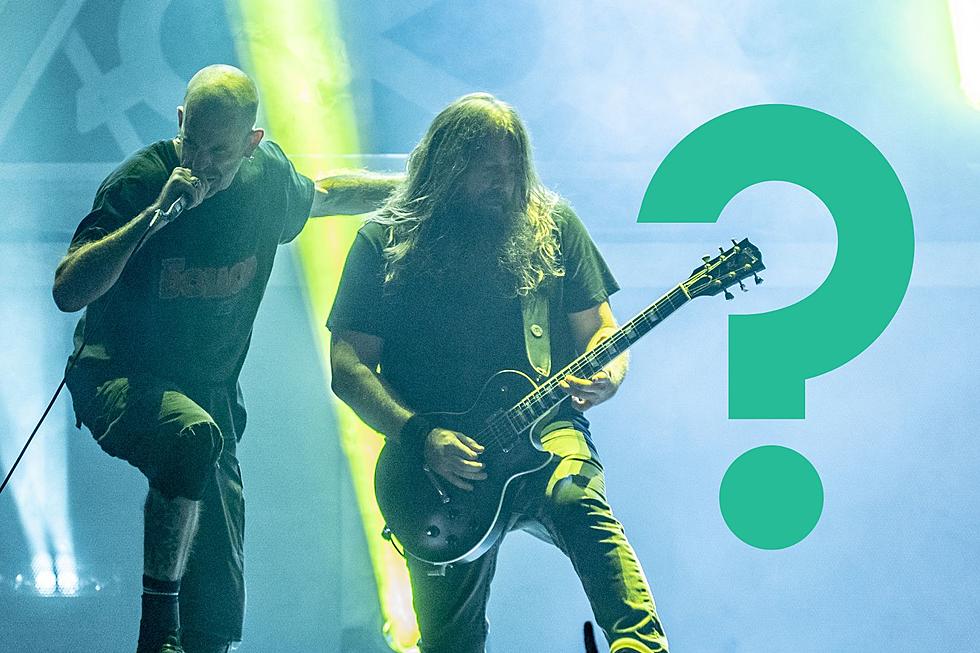
Lamb of God’s Mark Morton Reveals His Top 5 Guitar Albums
“What makes a great guitar album is very much the same as what makes great guitar players,” says Mark Morton, lead guitarist of Lamb of God. “When I hear someone who has a voice on the instrument, I respond in an immediate and meaningful way.”
Morton notes that while he appreciates technical ability, flash and blistering-speed chops don’t impress him as much as character and personality on the guitar. “You can always find someone who’s faster or has supreme chops, but that’s not the same as hearing a player who has a unique voice or a point of view that comes through on the instrument," says the guitarist. "There is something very personal about the guitarists who’ve reached me, because I felt as though they were speaking to me through the choices they’ve made or the sounds they’ve achieved.”
Morton is quick to point out that he doesn’t place himself in the same league as his favorite players, but he does strive to communicate at their level. “I’ve always wanted people to recognize my playing whenever they hear me, the way I do when I hear the guys I admire,” he says. “At times, I feel as though I’ve flirted with success in that regard. Within the context of our band, I think I bring things to the table that aren’t the norm for our genre. That’s how I try to be different, by simply being myself.”
What follows are Morton’s selections for five essential guitar albums, ranked in no particular order. “All of the guitarists on these albums have that unique characteristic, a player’s personal voice coming through,” he says. “There’s a real human connection that runs from their hands to my ears. That’s something pretty special, and when it happens you’ve got to savor it.”
Check out Mark Morton's Top 5 Guitar Albums below, as described by Morton himself. Be sure to pick up Lamb of God's new album, 'Sturm Und Drang,' at iTunes or Amazon.
'Houses of the Holy' (1973)
Led Zeppelin,Jimmy Page is an all-time favorite guitar player, my No. 1 guy all around. I struggled with this one because it would be so easy to name any Led Zeppelin album, especially Zeppelin II or IV -- they’re like the encyclopedias of great guitar playing. If you want to know how to write riffs and solos, you can’t go wrong with those records.
I picked Houses of the Holy because it’s my personal favorite Zeppelin album. It’s a more song-oriented record, and it’s got a different kind of character than anything else the band did. You only have to listen to “The Rain Song” to understand that. It’s just a masterpiece. The depth and level of thought that Page put into a composition like that is staggering. It’s so ambitious, intricate and magical -- I have to believe that he didn’t even know what he was doing; like it was guided by forces greater than just one man’s ideas.
Atlantic RecordsAtlantic Records 'Axis: Bold as Love' (1967)
The Jimi Hendrix ExperienceIn terms of sheer innovations and stretching the possibilities of what the guitar can do, Jimi Hendrix is in a league of his own. His imagination was just limitless. His implementation of effects is still astounding. Jimi was light years ahead of everybody else on that and so many other levels.
Jimi processed and manipulated the organic sound of the guitar and turned it into something totally different, and he took that and used it as an element of his style and playing. His writing, too, is incredible, and Axis is filled with amazing songs.
So many guitar tones and phrases that players use today were first heard on this album. I don’t think it’s possible to overstate its importance. The ambition, conceptualization and execution of the entire piece is mind-blowing. It’s like an explosion and a redefinition of rock ‘n’ roll. How did any one guy think of such a thing?
TrackTrack 'At Fillmore East' (1971)
The Allman Brothers BandThis is actually the first guitar album that popped into my head. I really used this record as a guitar-playing guide, not in a sterile way, but in a thrilling and almost romantic way. I would look at this album as a guitar lesson; I’d play to entire sides, just jamming and having a great time. A lick would go by and on the next bar I’d try to mimic it.
There’s a vast amount of tasteful, beautiful and goosebump-inducing playing on the record. It’s also got a magic to it in that it captures the spirit of its time. You feel as though you’re discovering a new sound or a scene that you didn’t know existed. It’s like when the older kids were next door, smoking cigarettes and playing cards; you’re not old enough to hang with them, but you’re looking at them from afar. This album made me feel like I was looking through a window at something really cool and important that I wanted to be a part of.
From what I understand, Duane Allman was a little unhappy with the way the band’s sound had been represented to this point. He felt that the only way to capture the real essence of the group was to record them playing live in a room, with the energy of the audience feeding them. He got it, for sure, on this album.
CapricornCapricorn Amorica (1994)
The Black CrowesA bit of an oddball choice, but it’s an important record to me. The Black Crowes might not be as influential as the other artists on my list, but to me, Marc Ford is one of those guys who has his own voice and knows how to communicate his thoughts through his guitar playing. He doesn’t just rattle off a catalog of blues licks; rather, he speaks his mind and lets you in on a feeling.
Whenever someone asks me what kind of guitar playing I’m into, I immediately say, “heavy blues.” I love British blues, but I need a certain kind of grit and grime -- that’s what hits the sweet spot for me. Marc Ford has that. He gets inside a note and sees what’s there, and his tonal choices are impeccable. The Black Crowes were a large band, and he handled his role beautifully. You felt him every time you heard him.
American RecordsAmerican Records 'Tres Hombres' (1973)
ZZ TopBack to the theme of heavy blues, Billy Gibbons personifies that spirit in his playing, especially in the earlier days. He almost defined it, really. Such high-caliber playing, from straight-up, hot-roddin’ boogie to “Hot, Blue and Righteous,” which is practically tear jerking.
Billy’s bends and his use of vibrato feel so personal to me. Just on a technical level, vibrato is about as unique as it gets -- no two players use it quite the same way. Some people get into it sharper than others and then they take it down; Santana starts it a bit flat and then he works his thing with it. Everybody has their own approach. And then there’s Gibbons, who just has his own masterful spin on vibrato. He and Stevie Ray Vaughan make my hair stand on end.
It’s good songwriting, too. The lyrics are funny and clever, and Billy’s playing matches the words perfectly. This is a band that knows what they’re doing -- musically, lyrically, sonically. Tres Hombres is great from beginning to end.
London RecordsLondon Records Bonus Video
More From Loudwire









